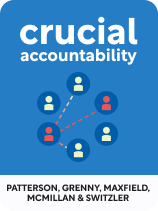

This article is an excerpt from the Shortform book guide to "Crucial Accountability" by Kerry Patterson, Joseph Grenny, et al.. Shortform has the world's best summaries and analyses of books you should be reading.
Like this article? Sign up for a free trial here .
Do you have some tough topics to talk about? How do you handle difficult situations that may arise?
The book Crucial Accountability teaches readers how to deal with tricky situations that may arise when you have tough topics to talk about. These points can apply to many kinds of difficult conversations.
Keep reading to find out how to handle tough topics to talk about in life, work, and relationships.
Truly Tough Situations and How to Handle Them
The authors note a few situations where extra steps or precautions may be necessary when you have tough topics to talk about. The section below will discuss these novel situations and how to handle them.
Dealing With an Obstinate Person
When the other person is impossible to hold accountable because they either refuse to have an accountability discussion or refuse to change their ways, your options are unfortunately limited. When you’ve done your best to converse and it seems the situation is a lost cause, you have two options: endure or end the relationship. This can be a tough choice when learning how to handle tough topics to talk about.
Enduring a relationship: When the issue isn’t big enough to end the relationship, we can learn to endure the issue by trying to see the other person’s story. This entails empathizing with the other person and coming to reasonable conclusions about their behavior.
(Shortform note: Experts note that in addition to the authors’ recommendations on how to cope, you should also know your triggers and avoid them when possible. If you do become triggered, take deep breaths and try to ground yourself in the present moment rather than your thoughts and emotions.)
Ending a Relationship: If you find that you cannot empathize with the other person and you remain upset over the issue, you’re not enduring but wallowing. Wallowing is when we remain in a situation but constantly complain, either internally or externally. In these situations, the authors say that you must end the relationship.
(Shortform note: Experts second the authors’ argument that persisting, unsolvable issues that cause distress warrant relationship termination. While it might be extremely difficult to end a relationship, experts explain that staying in a relationship where problems persist can be unhealthy for you and the other person, leading to paranoia, avoidance of intimacy, self-doubt, sense of doom, and cynicism. Further, the longer you stay in a toxic relationship, the more likely you are to carry these trauma symptoms into your next relationship.)
When You’re Changing the Rules or Breaking Standard Practice
When you change the rules or break standard practice, you may be changing or contradicting previous accountability expectations—such as holding people accountable in a previously accountability-free environment. In this situation, it’s common for people to resist a change to their routine, especially when they don’t understand why the change is necessary.
To get people on board with significant change:
- Inform influential people and ask them to spread the message that the standard practice is going to change and people will be held accountable for following the rules.
- Describe the current rules/practices and their natural consequences so people understand why things need to change.
- Describe your vision of how things should be instead, and then explain the rules and practices that should be enacted to materialize that vision.
- Contrast past practices and the new change so people can connect what they used to be doing to what they should be going instead.

———End of Preview———
Like what you just read? Read the rest of the world's best book summary and analysis of Kerry Patterson, Joseph Grenny, et al.'s "Crucial Accountability" at Shortform .
Here's what you'll find in our full Crucial Accountability summary :
- How to broach sensitive conversations with loved ones and coworkers
- How to prepare for, execute, and follow up on accountability conversations
- How to solve issues while improving your relationships






